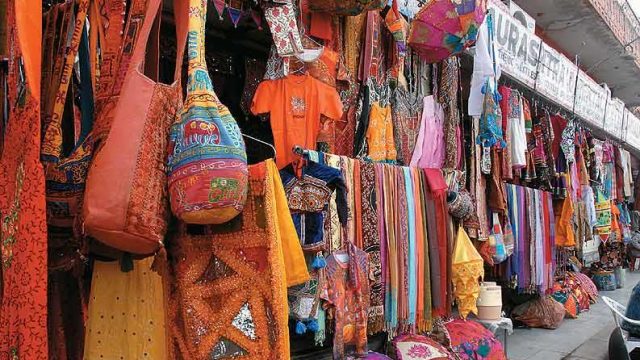I am waiting to take a flight to Delhi and my friends are making happy plans of picking me up from Jaipur instead — what with Delhi being covered with thick fog, they are joking that the flight will be diverted there. The alarm went off at a frightful hour this morning and bleary-eyed, I completely fail to find my friends amusing; nor do I fool myself for a moment that this extraordinary enthusiasm to drive for five hours in order to pick me up has something to do with their deep love for me. There are ulterior motives, and I know exactly what these are — the lure of shopping in Jaipur, the call of block-printed kurtas and Jaipuri razais and silver jewellery and jootis and lovely, affodable fabric by the trunkful. The wait for the flight is endless, but my habitual matutinal bad mood gradually dissipates as I embark on delicious imaginings of a fabulous shopping weekend in Jaipur.
My day would start with a trip to Amer Road. There’s a large shopping area there but several hours are easily spent at Ridhi Sidhi — pulling out mountains of quilted bedspreads, block-printed fabric, printed and quilted jackets, marvellously soft mulmul dohars (light summer quilts), printed shirts and baby quilts. Self-control is hard in this shop: the intricacies of the butas printed on the cloth and the delicacy of their colour palettes are all-absorbing — I want to buy nearly everything I see, and gift them to all the people I know will enjoy them.
Then to Anokhi Café for a light lunch of sandwiches and cake. There are Anokhi stores in many cities now but their flagship store in Jaipur is still a particular delight. (It used to be even more charming when it was housed in a bungalow with the outdoors café playing Ibrahim Ferrer.) Their museum on hand-printing displays printed textiles using the traditional craft of block printing. The tradition of making hand-printed textiles developed under the patronage of the Jaipur royal family. Intricate blocks are carved out of wood and the prints are characterised by graceful floral butas (large floral pattern) and butis (smaller floral patterns) or geometric forms, which emerged from a Mughal aesthetic. In earlier times of strict sartorial codes, motifs and colours on a garment would indicate the community and occupation of the wearer. Anokhi, Ratan and Soma are all well known for their block-printed garments and linen.
After lunch, I hop onto a cycle-rickshaw for a ride through the old city. Johari Bazaar, Tripolia and Chandpole have rows and rows of shops hugging each other. Tiny, anonymous shops here sell silver and meenakari jewellery, fluffy razais, lac bangles, colourful bandhej dupattas and leheriya saris. I look up and down Tripolia to find a shop that sells bahis — the hand-bound and stitched notebooks, used for keeping accounts. These books, bound with bright red cloth (the colour of wealth and also the goddess Lakshmi) and exposed, snaking lines of stitches have been a hit with my notebook-loving friends. Essentials done, there’s time enough for an amble down the chaotic market, glittering with metal and glass light-fittings and gaudy textiles and garments.
Next stops are at Amrapali and Tholia in the Panch Batti area. I look longingly at rows of exquisite kundan jewellery. A stunning style that came to Jaipur from Lahore, kundan is a combination of Mughal techniques of stone setting with meenakari work on the reverse of each piece. Exquisite as they are, I am not willing to burn big holes in my small pockets — the silver will have to do.
Panch Batti on M.I. Road is lined with shops selling silver and strings of semi-precious stones. The Gem Palace on M.I. Road is the largest and most well known shop for silver, gold and Kundan jewellery. Acquisitions? A tiny beaten-silver pair for my ears.
There is more to see: in particular, some of Jaipur’s famed Blue Pottery. I set off to meet a friend who works with a local craftsperson. The workplace is a large workroom with neat shelves of pottery in various stages of finish — the floral and water patterns on them are of a Persian style, painted on with mineral pigments and finished with a glass glaze. The locally developed brilliant turquoise glazes draw from the blue-tiled mosques of Central Asia. The potter’s family tells me the legend: Maharaja Sawai Ram II was watching the imperial kite competing with others when it was cut off by a kite belonging to a pair of potters. The potters had coated their kite string with the blue glass-like dust their pottery was made of. The king was impressed and placed them in the School of Art, and thus Blue Pottery came to Jaipur. I buy myself an elegant leher (wave)-patterned soap-dish in bright blue and drag my hardworking friend out for a cup of coffee.
I am a sated shopper now — in my dreams, of course — and my flight is ready to be boarded. I think of my Jaipuri razai at home in Delhi and can’t wait to climb under it!
Listings
Amrapali: Panch Batti, M.I. Road, 2362768
Anokhi: C-11 Prithviraj Road, 4007244/45
Anokhi Museum of Hand Printing: Anokhi Haveli, Khedi Gate Amber, 2530226, 2531267
Neerja International Inc: S-19 Bhawani Singh Road, C- Scheme Ext., 2224395
Ratan Textiles: F 200 / 201 EPIP, Sitapura
Ridhi Sidhi Textiles: 9 East Govind Nagar, Amer Palace Road, 2633134
Soma Shop: 5 Jacob Road, Civil Lines, 2222778
The Gem Palace: M.I. Road, 2363061
Tholia Gems and Jewels: Tholia Building, M.I. Road, 2372790




